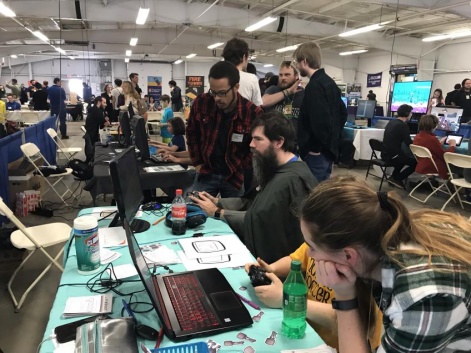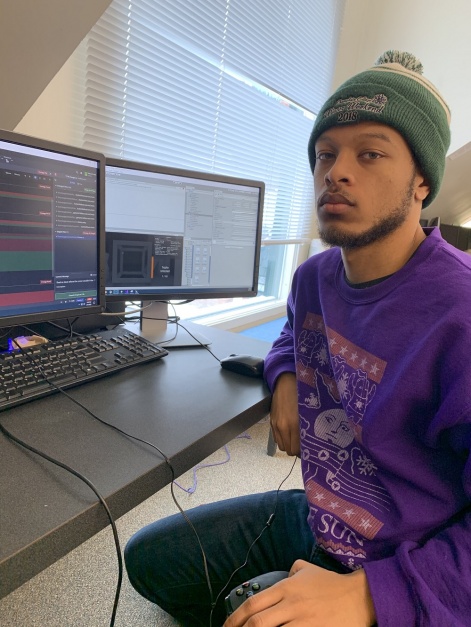For decades, no matter the industry, people of colour have suffered through a lack of opportunity and a lack of respect, leaving them stuck playing second fiddle throughout their careers.
The games industry is no different, and here at PocketGamer.biz we wanted to do our part and help bring attention to the many incredible people of colour that help make up this sector.
That is why we are committing to a new long-term regular feature to spotlight these people and their careers.
So, welcome to our 'POC in Mobile' series, where discussion about finding a place in the games industry, the various challenges faced as a minority, and what truly needs to be done to make games more diverse will be the focal points of conversations.
This week, we spoke to Wimo Games associate software engineer Walter Hill about why there is a need to promote more developers of colour into leadership positions to help solve the issue of visibility, as well as why more tools and resources should be accessible and affordable to everyone globally.
PocketGamer.biz: Can you start off by telling us about your role in games and what it entails?
Walter Hill: I currently work in the games industry as a gameplay programmer on mobile games at Wimo Games in Texas, US.
For me, working as a gameplay programmer means communicating closely with game designers and artists to create code for objects and characters the player can interact with directly. Things like user interfaces, dialogue, and combat.
Why did you want to work in the games industry?
I have wanted to work in the games industry since my early days in high school (sometime around 2013), with Halo 3 was the game that made me realise video games were hand-made by teams full of creative people.
You quickly learn that something as seemingly simple as Pac-Man is an impressive work of creativity, discipline and craft.Walter Hill
The scope and style of Halo 3 were what first made me wonder if there was a space for me within games, so I could help make experiences like that. Since then I've worked on all kinds of games and gone to college to help realise my dream, and this past summer I earned my first job! I really value games as an art form and helping to build them and give players games that entertain and challenge is a joy and a privilege.
How would you recommend people get started in games? Any tools or literature you would advise?
Get started by making stuff. I would recommend a game engine like GameMaker Studio or Unity as great places to start. They both have their own library of learning resources, and the online developer communities around those engines are great about providing their own tutorials and free development resources for learning game development.
It's the best way to learn a little bit about all the facets of making a game. You quickly learn that something as seemingly simple as Pac-Man is an impressive work of creativity, discipline and craft.
When it comes to literature, I would first encourage folks looking to get into the industry to study its history. Books like The Ultimate History of Video Games broadened my view of what video games are and how they've changed. Viewing the state of video games in the light of the medium's history can inspire new ideas and illuminate the creative and cultural foundation today's games are built upon.
When it comes to books about making games, Level Up: The Guide to Great Video Game Design is great for learning more about designing games, their stories, characters, and challenges.
What did you study (if anything) for your role? Are there any courses out there that you would advise for aspiring professionals?
I went to Champlain College and studied Computer Science to focus on the programming aspect of game development. I would suggest aspiring creators should try and take courses across the spectrum of games development. For me, that meant taking an interactive narrative course focused on narrative game design alongside my coding courses. As a programmer, it's essential that aspiring coders take foundational courses in data structures and algorithms.

With the skills you learn in those courses, you can obtain some of the base tools needed to build more complete and more complex games. Ultimately, any course that has you making games as a part of the class, especially with a team, is a great opportunity to learn and build your skills.
What do you think should be done to improve diversity, not only across the games industry, but across all industries?
I think solutions on the diversity front have to be attacked from two angles. On the corporate, top-down side, companies have to actively seek out candidates of colour whether that's through school partnerships or company events. In games, developers of colour exist and are out there doing great work.
My Twitter feed is full of illustrators and writers and studio owners. The issue is companies are not making the effort to seek out diverse candidates outside of diversity statements tucked into their career pages.
The more our tools and resources and knowledge are accessible and affordable to everyone the world over, the more space we create for non-white developers to experiment and grow.Walter Hill
From a more bottom-up angle, the democratisation of game development tools has been instrumental in allowing more diverse developers to get a peek behind the curtain in terms of what it takes to get a game made. The more our tools and resources and knowledge are accessible and affordable to everyone the world over, the more space we create for non-white developers to experiment and grow.
What are the biggest challenges you have encountered since joining the industry?
Since joining the industry in full this past summer, the biggest challenge for me has been the lack of social interaction because of remote work. I started working in games during the COVID-19 outbreak and that's made it difficult to connect in the real world with my coworkers during and outside of work.
I'm looking forward to working in an office alongside my colleagues someday soon (hopefully). Also, making games is just hard! There are a lot of moving pieces and individuals involved. The work is rewarding, but it's challenging all the same.
What do you think can be done to help encourage more people of colour to get into games?
Funding and visibility. To me, those two things are the most important factors in growing the number of diverse developers in the industry. On the indie side, developers of colour are present and doing the work.
They need funding to not only help create the best version of their ideas but to ensure their games reach as many players as possible. And with that funding comes visibility. When a publisher throws their weight behind a game from a developer of colour, they enable them to hire other diverse developers and to add their unique artistic voice to the conversation around games.
On the triple-A side, visibility means promoting more developers of colour to leadership positions. It can be demoralising to watch game conferences or see company photos and only see one or two people that look like you. Simply seeing people that look like you, in positions you've dreamed of, or maybe never even heard of, can open up the space of what's possible in a person's mind.
Is there anything that recruiters should be doing differently to address the lack of diversity across not only games development but all industries?
As a developer of colour, I would like to hear more from recruiters during the interview process and during info sessions at schools about what they do to support diversity at their studio.

Whether that's resource groups within the development team or local community outreach, hearing that a studio is actively seeking to support diverse developers would certainly encourage me to send an application their way.
Since the surge in the #BlackLivesMatters campaign that took place last year, what changes (if any) have you seen from across the industry to address the issue?
I've noticed the slow rise in funding and publishing opportunities for developers of colour over the past year, and those initiatives are great! It felt like there were zero of those kinds of opportunities a year ago. I hope those opportunities continue to grow in scale and frequency.
On another front, I think companies still have a lot of work to do in detoxifying online spaces in games. It feels like the games industry tolerates or looks away from the hateful communities present in games.
I'd like to see more industry leaders come out more vocally against hate in online communities and also present the steps their organisations are taking to make games as a whole more welcoming to women and people of colour. If people of colour are pushed out of games as a way to entertain themselves, they're less likely to want to make them.
What advice do you have for other people of colour that are looking at getting into games?
Do your best to seek out friends and fellow creators of colour for inspiration, collaboration, and critique.
We may be hard to find, but we are here and we are waiting for you to come to join us. LinkedIn and Twitter are great tools for building a network of diverse contacts to reach out to for advice and support and just to see cool art. I'm always willing to chat too!





















